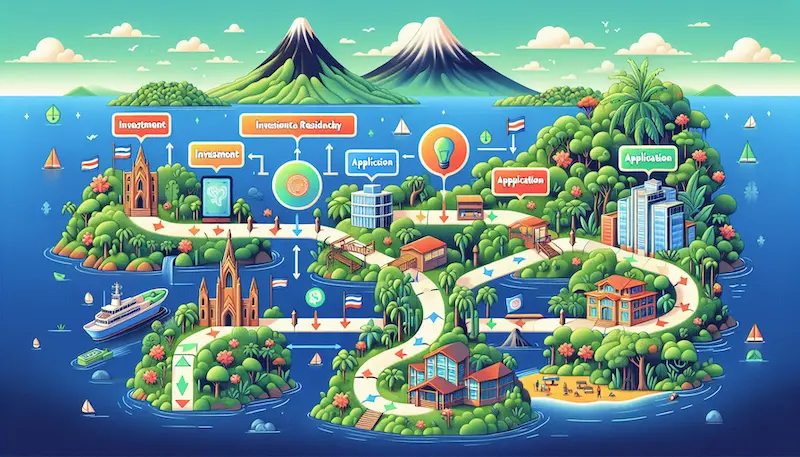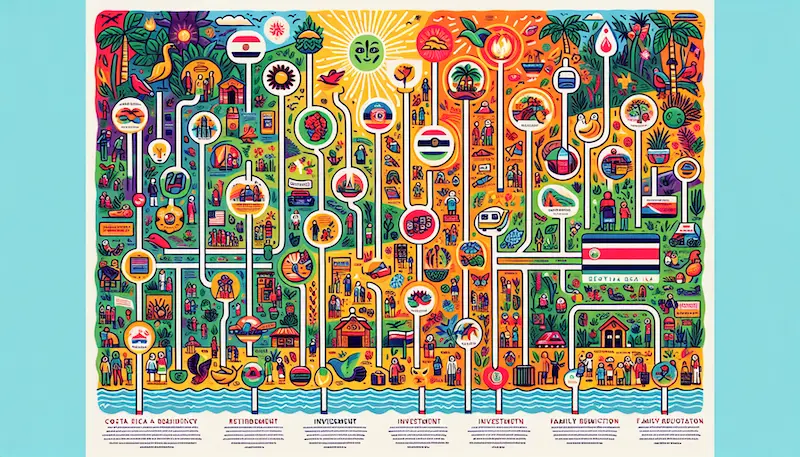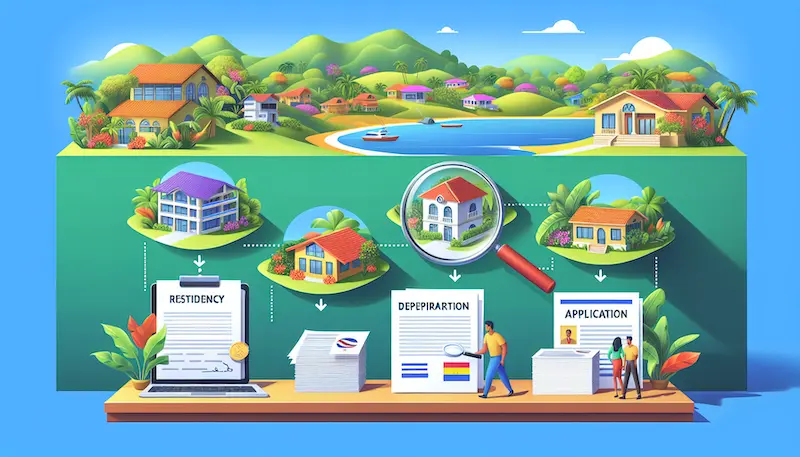Buying real estate in Costa Rica does not automatically grant you residency; however, does buying real estate in Costa Rica give me the opportunity ot become a resident? Yes.
Investing a minimum of $150,000 in property can qualify you for the Inversionista (Investor) Residency. This guide explains the process, requirements, and benefits of obtaining residency through real estate investment.
Key Takeaways
-
Costa Rica offers various residency options, including Pensionado, Rentista, and Inversionista, each tailored to different demographic and financial profiles.
-
The Inversionista Residency allows for legal residency through a one-time investment of at least $150,000 in real estate, with benefits like year-round residence and access to quality healthcare.
-
The residency application process requires careful preparation of documents, compliance with legal obligations, and can take nine to twelve months; consulting professionals is recommended to navigate these complexities.
Why Consider Costa Rican Residency
Costa Rica’s allure extends beyond its picturesque landscapes. The country consistently ranks high on global happiness and peace indices, making it a prime choice for individuals seeking a better quality of life. With modern amenities, a robust healthcare system, and diverse recreational opportunities, Costa Rica offers an attractive lifestyle for potential residents.
Costa Rica offers multiple residency options to suit various needs and financial situations, from retirees with steady pensions to real estate investors. Understanding these pathways helps in making an informed decision about your future in this beautiful country.
Types of Residency
Costa Rica offers several types of residency, each catering to different demographics and financial profiles. The Pensionado Residency is designed for retirees who can demonstrate a stable monthly income from a pension, typically exceeding $1,000. This costa rica residency option grants access to Costa Rica’s public healthcare system, which is a significant benefit for retirees.
The Rentista Residency requires proof of a consistent income of at least $2,500 per month for two years or a substantial savings of $60,000. For those looking to invest, the Inversionista Residency is ideal, requiring a minimum investment of $150,000 in real estate or other approved ventures.
Each residency type comes with specific requirements and benefits, so choosing one that aligns with your lifestyle and financial situation is crucial.
Inversionista (Investor) Residency

For real estate enthusiasts, the Inversionista Residency is the most relevant option. An investment of at least $150,000 in Costa Rican real estate qualifies you for this type of residency. This pathway not only provides a tangible asset but also a viable route to becoming a legal resident in Costa Rica.
The Inversionista Residency is particularly appealing because it does not require ongoing proof of income, unlike some other residency options. Once the investment is made, you can focus on enjoying your new life in Costa Rica without the need for frequent renewals or additional financial proofs.
Requirements for Investor Residency
Qualifying for the Inversionista Residency requires a minimum investment of $150,000 in real estate or other approved projects. This investment must be substantiated with proper documentation, ensuring that the property meets the legal requirements set by Costa Rican law.
Investors should select properties that meet the investment threshold and align with their goals. Consulting a knowledgeable real estate agent and legal advisor helps navigate the complexities of property investment in Costa Rica.
Application Process
The application process for Inversionista Residency involves several critical steps. Ensure your property deed is ready and accurately reflects your personal investment in the property. If assurance of personal investment, say through a foreign corporation (issued outside Costa Rica), it may need translation and apostille.
Gather required documents, such as a police clearance certificate and financial statements, then submit them to the Immigration Department along with the necessary fees. Filing the residency application in person at designated immigration offices helps avoid errors that could delay the review process. It is essential that you obtain the latest documentation requirements from the immigration office before gathering any documents. They can change without notice, and there are some very specific requirements for several of the documents.
Be prepared for a thorough review of your application. Ensuring all documents are in order and meet the legal requirements helps streamline the temporary residency process. Securing residency status usually takes between 6 and 12 months depending on the Immigration department workload.
Benefits of Investor Residency
One of the primary advantages is the right to live in Costa Rica year-round without the need for visa renewals. This provides stability and the freedom to fully immerse yourself in the Costa Rican lifestyle.
In addition to permanent residency, investors gain access to Costa Rica’s high-quality healthcare system. This is particularly appealing for expatriates who must prioritize medical care. There are also potential tax benefits, as Costa Rica offers favorable tax conditions for expatriates, including exemptions on income earned outside the country.
Furthermore, investing in Costa Rica real estate can yield significant financial returns. The country’s booming tourism industry and growing demand for rental properties can provide a steady income stream. With property values appreciating over time, your investment could grow substantially, making it a financially sound decision.
Comparing Residency Options

Comparing the Inversionista Residency with programs like Pensionado and Rentista is key. Each option has unique requirements and benefits, so understanding these differences helps you choose the best pathway for your situation.
The Inversionista Residency stands out for requiring a one-time investment, unlike the Pensionado and Rentista programs, which need ongoing proof of income. This is advantageous for those preferring a single, upfront investment over continuous financial documentation.
Pensionado (Retiree) Residency
The Pensionado Residency is tailored for retirees with a stable monthly income of at least $1,000 from a pension or retirement fund. This program is attractive for retirees looking to enjoy the “pura vida” lifestyle without the burden of substantial investments, including the option of a retirement visa.
A key benefit of the Pensionado Residency is access to Costa Rica’s public healthcare system, known for its quality and affordability. After five years of residence, Pensionado residents can qualify for permanent residency by visiting the country once a year, and this pathway also allows for applying for Costa Rican citizenship after seven years.
Rentista Residency
The Rentista Residency targets individuals who can show a consistent income of at least $2,500 per month or maintain a minimum investment of $60,000. This program offers flexibility for those without a monthly salary, enabling them to live in Costa Rica based on financial stability.
Applicants for Rentista Residency must prove their financial capability through substantial savings or a reliable income source, including a Costa Rican bank account. This option suits entrepreneurs, freelancers, and digital nomads who may not have a traditional pension but still wish to reside in Costa Rica.
Potential Challenges and Considerations
While obtaining residency in Costa Rica through real estate investment offers many benefits, it’s essential to be aware of potential challenges. One significant consideration is the processing time, which can range from nine to twelve months. This period requires patience and meticulous preparation to ensure a smooth application process. It is not uncommon to be called back in to resubmit a document or to clarify something.
Prospective residents should also consider ongoing requirements to maintain residency status, such as adhering to local laws, maintaining health insurance, and fulfilling tax obligations. These factors can impact overall experience and financial planning.
Processing Time and Legal Obligations
The processing time for residency applications in Costa Rica typically ranges from nine to twelve months. This period can be challenging for those eager to start their new life in Costa Rica, but thorough preparation can help minimize delays.
Foreign property owners need to navigate legal obligations, like managing property remotely and complying with local regulations. Reliable local support from a property manager or legal advisor can effectively address these challenges.
Ongoing Requirements
To maintain residency in Costa Rica, residents must comply with several ongoing requirements. These include enrolling in the national health insurance system, known as the Caja Costarricense de Seguro Social (CCSS), and maintaining retirement insurance.
Residents must also fulfill physical presence requirements, such as visiting Costa Rica annually, to remain connected to the country and maintain legal residency status.
Steps to Obtain Residency Through Real Estate

To obtain residency in Costa Rica through real estate, start by finding the right property that aligns with your investment goals and meets the minimum investment requirement of $150,000. Consider factors like location, amenities, possible exit strategy (how long it might take to sell in the event of an emergency exit from Costa Rica), and potential for rental income.
An experienced real estate professional can help you with property ownership compliance for Costa Rican immigration requirements.
Finding the Right Property
Obviously, investment to obtain permanent residency is not just about buying any old property. Finding the right property to include with your residency application is crucial. Focus on areas that offer a high quality of life and potential for appreciation, such as popular tourist destinations or emerging neighborhoods (i.e. new or highly popular gated communities).
Understanding local zoning laws and property ownership rights is also important for foreign investors. A knowledgeable real estate agent can help navigate these complexities and find a property that meets your needs and investment goals.
Document Preparation
Accurate document preparation is crucial for a successful residency application. Key documents include the property deed, which must be in your name and reflect the qualifying investment, and a police clearance certificate to verify your clean criminal record.
Financial statements demonstrating your ability to support yourself in Costa Rica are also necessary. Consulting with legal or real estate professionals can help ensure all documents are correctly prepared and submitted.
Submitting Your Application
Once your documents are in order, you can submit your application to the Immigration Department in Costa Rica. Once your paperwork is officially "accepted" by Immigration, you will get what is known as an "expediente", or record number. This enables you to come and go as you like, even if you stay longer than a normal tourist visa allows. Simply show the document with your record number to the customs agents upon departure and arrival and you will be welcomed. Often they will give you a 180 day tourist visa knowing that you will be waiting for your final approval.
When investing in real estate, you can include your spouse and dependent children under 18 in your application.
Conclusion: Is Buying Real Estate the Right Path for You?

Buying real estate in Costa Rica can be a popular path to obtaining residency, offering numerous benefits such as a stable living environment and potential financial returns. However, it’s essential to weigh the upfront costs against the long-term advantages and consider if this investment aligns with your personal and financial goals.
Though the process requires significant preparation and compliance with legal requirements, the rewards can be substantial. From year-round tropical living to excellent healthcare and potential tax benefits, investing in Costa Rica real estate can be a fulfilling and wise choice for many.
Explore Real Estate Opportunities
If you’re ready to explore real estate opportunities in Costa Rica, now is the time to act. The country’s tourism industry and real estate market offer a range of productive projects and investment possibilities that could qualify you for residency.
Consulting with a legal expert or real estate professional provides valuable insights and guidance. To get started, reach out to a trusted advisor or visit specialized real estate websites focused on Costa Rican properties.
Summary
In summary, obtaining residency in Costa Rica through real estate investment offers a unique blend of lifestyle benefits and financial opportunities. From the initial investment and application process to understanding the various residency options, this guide provides a comprehensive overview to help you make informed decisions.
As you contemplate your future in Costa Rica, remember that thorough research and professional guidance are key to a successful transition. Step one is to find an experienced real estate agent that will guide you through the options, focused on your specific needs and goals. Embrace the adventure, and soon you could be living the “pura vida” lifestyle in one of the world’s most beautiful and welcoming countries.
Frequently Asked Questions
What is the minimum investment required for Inversionista Residency in Costa Rica?
The minimum investment required for Inversionista Residency in Costa Rica is $150,000 in real estate or other approved investments. This amount ensures eligibility for the residency program.
How long does it take to process a residency application in Costa Rica?
Residency applications in Costa Rica generally take about nine to twelve months to process. It's important to plan accordingly to avoid any delays in your move.
Can my family also obtain residency if I invest in Costa Rican real estate?
Yes, your spouse and dependent children under 18 can obtain residency through your investment in Costa Rican real estate.
What are the benefits of obtaining investor residency in Costa Rica?
Obtaining investor residency in Costa Rica allows you to live there year-round, access high-quality healthcare, enjoy potential tax advantages, and provides a pathway to citizenship after a few years. This residency can significantly enhance your lifestyle and investment opportunities in the country.
What ongoing requirements must be met to maintain residency status in Costa Rica?
To maintain residency status in Costa Rica, residents must maintain national health insurance, comply with local laws, and make annual visits to the country. Failure to meet these requirements may jeopardize residency status.



